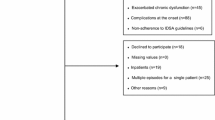Abstract
Goals of work
Febrile neutropenia (FN) represents a spectrum of severity in which low-risk patients can be defined using the Multinational Association for Supportive Care in Cancer (MASCC) risk index. However, despite publication in 2000, there remains limited published literature to date to support the use of MASCC risk assessment in routine clinical practice and eligibility for early hospital discharge. In this study, we present our experience with the routine use of the MASCC risk index to determine the management of FN in our institution.
Patients and methods
Patients treated for solid tumours or lymphomas with low-risk FN (MASCC score ≥21) were eligible for oral antibiotics (ciprofloxacin plus either co-amoxiclav or doxycycline) and for early hospital discharge irrespective of first or subsequent episode. The primary outcome was rate of resolution of FN without serious medical complications (SMC). Secondary outcomes were the “success” of antibiotic therapy without treatment modifications, duration of hospitalisation and rate of readmissions.
Results
A total of 100 FN episodes occurring in 83 patients were treated over a 6-month period. Ninety of these episodes were low-risk (90%), of which 75 received oral antibiotics (83.3%) and 3 (3.3%) experienced SMC, and the success rate was 94.5% [95% confidence interval (CI) 89.6–99.3%] in low-risk episodes. The median duration of hospitalisation was 2.5 days (25th centile: 1.0 day; 75th centile: 5.0 days) in low-risk compared to 6.5 days (25th centile: 5.3 days; 75th centile: 9.3 days) in high-risk episodes (p = 0.003); 2 days for low-risk episodes treated with oral antibiotics compared to 4 days for low-risk receiving intravenous antibiotics (p = 0.015). Positive predictive value for the MASCC index was 96.7% (95% CI 95.0–98.6%).
Conclusion
The MASCC risk index is both feasible and safe when used in standard clinical practice to guide the management of FN in patients with solid tumours and lymphomas. Patients predicted to have low risk can be managed safely with oral antibiotics and early hospital discharge.


Similar content being viewed by others
References
Elting LS, Rubenstein EB, Rolston KV, Bodey GP (1997) Outcomes of bacteremia in patients with cancer and neutropenia: observations from two decades of epidemiological and clinical trials. Clin Infect Dis 25:247–259
Freifeld A, Marchigiani D, Walsh T, Chanock S, Lewis L, Hiemenz J, Hiemenz S, Hicks JE, Gill V, Steinberg SM, Pizzo PA (1999) A double-blind comparison of empirical oral and intravenous antibiotic therapy for low-risk febrile patients with neutropenia during cancer chemotherapy. N Engl J Med 341:305–311
Innes HE, Smith DB, O’Reilly SM, Clark PI, Kelly V, Marshall E (2003) Oral Antibiotics with early discharge compared with in-patients intraveneous antibiotics for low-risk febrile neutropenia in patients with cancer: a prospective randomized controlled single center study. Br J Cancer 89(1):43–49
Kern WV, Cometta A, De Bock R, Langenaeken J, Paesmans M, Gaya H (1999) Oral versus intravenous empirical antimicrobial therapy for fever in patients with granulocytopenia who are receiving cancer chemotherapy. International Antimicrobial Therapy Cooperative Group of the European Organization for Research and Treatment of Cancer. N Engl J Med 341:312–318
Klastersky J, Paesmans M, Rubenstein EB, Boyer M, Elting L, Feld R, Gallagher J, Herrstedt J, Rapoport B, Rolston K, Talcott J (2000) The Multinational Association for Supportive Care in Cancer risk index: a multinational scoring system for identifying low-risk febrile neutropenic cancer patients. J Clin Oncol 18:3038–3051
Klastersky J, Paesmans M, Georgala A, Muanza F, Plehiers B, Dubreucq L, Lalami Y, Aoun M, Barette M (2006) Outpatient oral antibiotics for febrile neutropenic cancer patients using a score predictive for complications. J Clin Oncol 24:4129–4134
Marshall E, Smith DB, O’Reilly SM, Murray A, Kelly V, Clark PI (2000) Low-dose continuous-infusion ceftazidime monotherapy in low-risk febrile neutropenic patients. Support Care Cancer 8:198–202
Paesmans M, Rapoport B, Maertens J, Slabbeer C, Ferrant A, Wingard J, Aoun M, Dubreucq L, Plehiers B, Klastersky J (2003) Multicentric prospective validation of the MASCC risk-index score for identification of febrile neutropenic cancer patients at low-risk for serious medical complications. Proc Am Soc Clin Oncol 22:2235
Rubin M, Hathorn JW, Pizzo PA (1988) Controversies in the management of febrile neutropenic cancer patients. Cancer Invest 6:167–184
Talcott JA, Finberg R, Mayer RJ, Goldman L (1988) The medical course of cancer patients with fever and neutropenia. Clinical identification of a low-risk subgroup at presentation. Arch Intern Med 148:2561–2568
Talcott JA, Siegel RD, Finberg R, Goldman L (1992) Risk assessment in cancer patients with fever and neutropenia: a prospective, two-center validation of a prediction rule. J Clin Oncol 10:316–322
Uys A, Rapoport BL, Anderson R (2004) Febrile neutropenia: a prospective study to validate the Multinational Association of Supportive care of Cancer (MASCC) risk-index score. Support Care Cancer 8:556–560
Viscoli C, Bruzzi P, Castagnola E, Boni L, Calandra T, Gaya H, Meunier F, Feld R, Zinner S, Klastersky J (1994) Factors associated with bacteraemia in febrile, granulocytopenic cancer patients. The International Antimicrobial Therapy Cooperative Group (IATCG) of the European Organization for Research and Treatment of Cancer (EORTC). Eur J Cancer 30A:430–437
Author information
Authors and Affiliations
Corresponding author
Rights and permissions
About this article
Cite this article
Innes, H., Lim, S.L., Hall, A. et al. Management of febrile neutropenia in solid tumours and lymphomas using the Multinational Association for Supportive Care in Cancer (MASCC) risk index: feasibility and safety in routine clinical practice. Support Care Cancer 16, 485–491 (2008). https://doi.org/10.1007/s00520-007-0334-8
Received:
Accepted:
Published:
Issue Date:
DOI: https://doi.org/10.1007/s00520-007-0334-8




